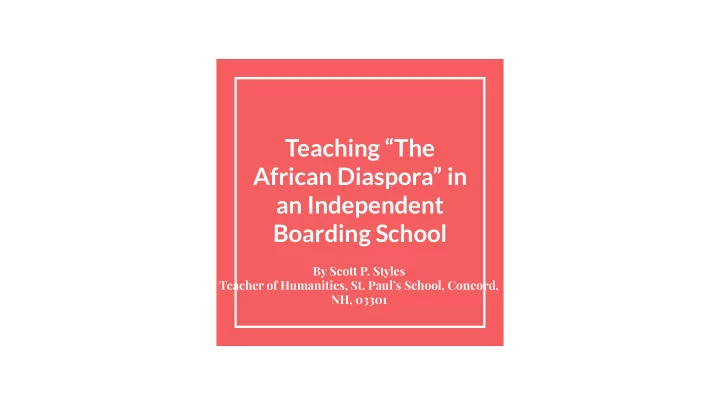

Teaching “The African Diaspora” in an Independent Boarding School By Scott P. Styles Teacher of Humanities, St. Paul’s School, Concord, NH, 03301
Relevance Liberate: Africa is rich culturally, intellectually, and historically, and rising in economic and geopolitical significance. Co-Create: Offer and discuss assignments and assessments that foster student reflection and collaboration. Thrive: Instill pride and to inspire students of African descent, and to instill wonder, admiration, and respect in those who are not.
Background of SPS 1.) Independent, rural-suburban, 100% boarding school located in Concord, NH, the state capital. 2.) Approximately 535 students, 9-12, $60,000 tuition, room, and board; 63%-37%. Black (including African): ~ 9% 3.) Fully-residential, teachers and students. 4.) 10-11 week terms (not all full weeks).
Background of my classes March through June of 2019 September through November of 2019 My class (grade level): Only five students My class (grade level): Only six students 1. Ghanaian-American male (11) 1. Indian-American male (12) 2. Latino-American male (12) 2. European-American female (12) 3. Bahamian-American female (12) 3. European-American female (12) 4. African-American female (10) 4. Nigerian-American female (12) 5. Korean-American female (11) 5. European-American male (12) 6. European-American male (12)
Takeaways SAMPLE ASSESSMENTS SAMPLE CLASSROOM ACTIVITIES 1.) Weekly or bi-weekly website work. 1.) Online research. 2.) Research paper at the end of the course. 2.) Reading and responding to ADC articles and Manning’s book. 3.) Class participation. 3.) Interviews of local Africans. 4.) Gallery walks (e.g., reflection on Lawrence’s art, life). 4.) Homework completion and accuracy. 5.) Documentary viewing and analysis. 6.) Field trip to Museum of National History and the 5.) Ppt./Google Slides presentations. NMAAHC. 7.) Google Slides/PPT. Presentations. 6.) Museum photo curation project. 8.) Mapwork: countries/capitals/ geography/kingdoms/areas of colonization (1945). 7.) Oral assessment of knowledge learned. 9.) Current events discussion and application to learning. 10.) Reading and reflecting on other students’ (e.g., Grissom 8.) Physical, cultural, and historical geography (maps). High School’s) work. 11.) Making African stoles and kufis. 9.) Performance of skits that represent cultural mores.
Why websites? Why audio-visual project? 1. Encourage collaboration. 1. Applicable to real-life. 2. Promote design-thinking (defend humanities): 2. Encourages meta-cognition. spacing, color, proportionality. 3. Promotes design-thinking (and defend 3. Cultivate reflection on the material to enhance humanities) in spacing, color, proportionality, retention (Brown, et. al). choice and rationale. 4. Develop critical thinking skills. 4. Practices critical thinking. 5. Foster responsibility to both collective and 5. Fosters a sense of responsibility to both self and individual. community. 6. Establish an online learning journal and teaching 6. Completes a final project that will educate others. resource. 7. Incorporates both aural and visual senses. 7. Practice for National History Day competition AV project link: (www.nhd.org). https://youtu.be/0WYaDVEak4g Website link: https://sites.google.com/sps.edu/theafricandiaspora-cjm/home
Student feedback 1.) “Make space for current events in the course so that we students can make connections to what we’re learning about ancient Africa to the present.” 2.) “Keep the websites in the course. When we’re thinking about what information about the African diaspora we should upload to our websites and why (through the lens of what would most interest our peers), we pay closer attention and think more critically rather than just regurgitate information for quizzes or class discussion.” 3.) “The best way to learn material is to teach it. I like the way that we think of ourselves as teachers.” 4.) “Read more from the textbook (Manning’s The African Diaspora) . It was really engaging. We should read and talk about it at least once a week.” 5.) “Continue to make it project-based. That made it fun.” 6.) “Hold debates about historically or currently controversial subjects.” 7.) “Keep the field trip to Washington, D.C. Make it longer, if possible!” 8.) “I think this course is necessary because our curriculum is Eurocentric and we tend to learn more about Europe’s involvement in Africa rather than Africa’s unique cultural, intellectual, and historical legacy.” 9.) “We should have the opportunity to present our findings to the school.” 10.) “There’s so much to learn that it should be a two-term course.”
What have I learned? 1) A lot of thought must go into what to teach, and how long to spend on it. Put a lot of time into UBD. 2) Kids like the history more than I would have thought they would. 3) Kids want to make direct connections from the past to the present. 4) Kids like to design websites, give presentations, and do multimedia projects. 5) Some kids are concerned about cultural appropriation if they wear clothing that is not from their own heritage. 6) I’m not an expert but I know enough to facilitate an engaging learning experience for my kids. 7) There’s still a lot to learn about the subject matter as well has how to teach it so that students maintain their engagement and sense of wonder about the material. 8) It’s important for teachers to dialogue with their students about assessments because they can help hone their initial ideas. 9) Make it as realistic and applicable as possible to real life. 10) Ask for suggestions and advice from other teachers who have taught it.
Thanks! Contact information Scott P. Styles Teacher of Humanities St. Paul’s School Concord, NH, 03301 sstyles@sps.edu (603) 229-5500, ext. 6057
Recommend
More recommend